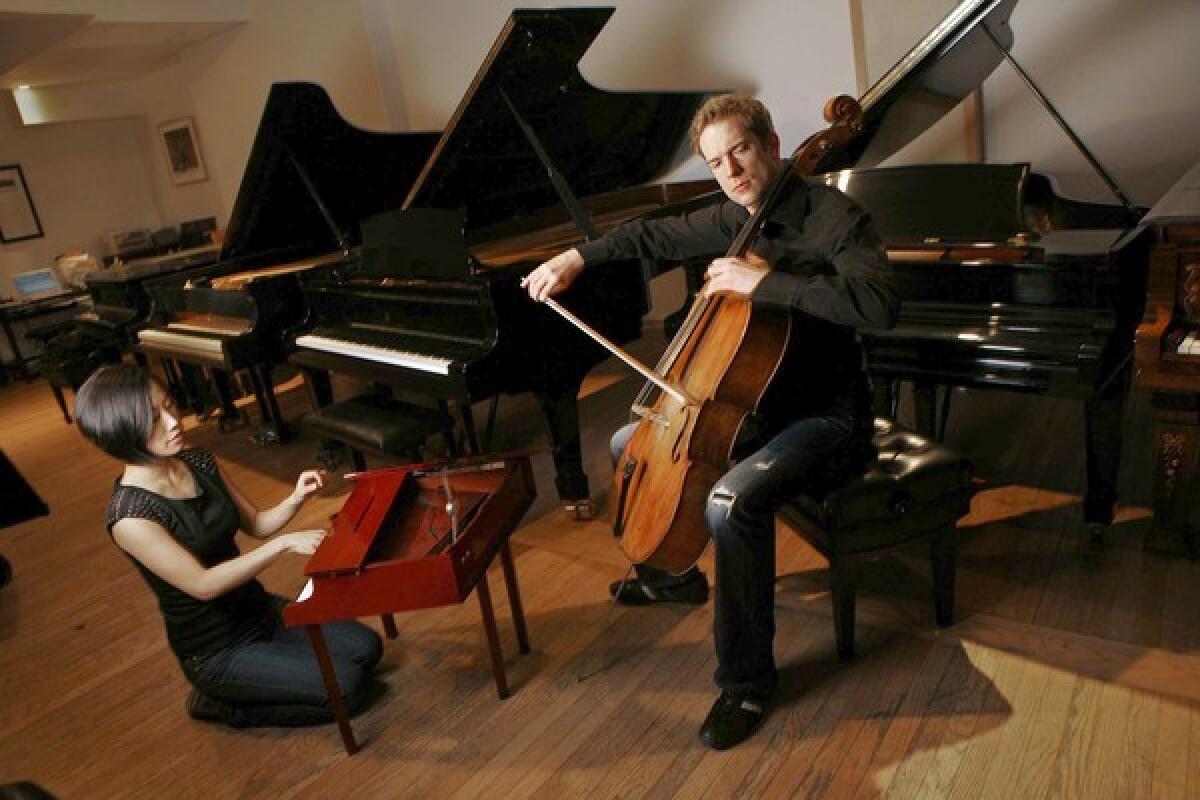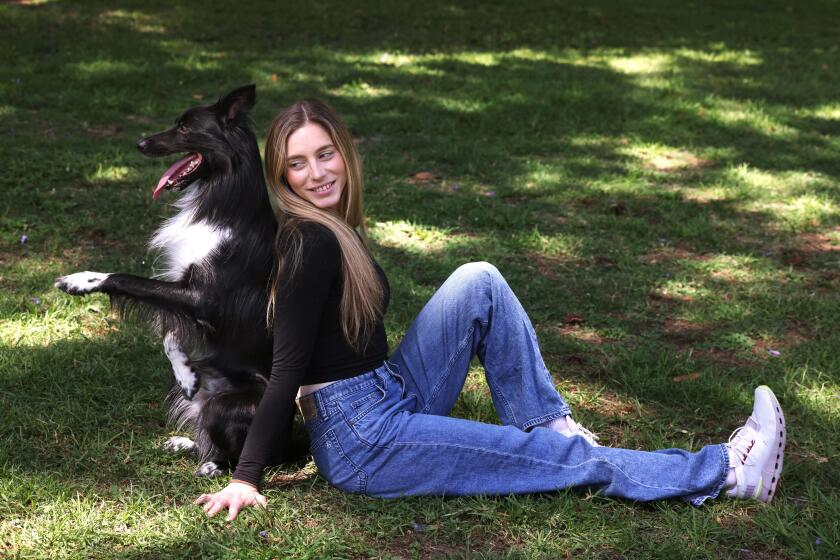Johannes Moser wants you to relax into classical music

There’s nothing new about classical musicians trying to expand their fan base. Even if deeds don’t always match goals, plenty of performers make the effort. Still, one doesn’t expect a largely unknown, foreign artist with little connection to this country to undertake such a project in America -- let alone mostly fund the enterprise himself. Yet here is Johannes Moser, a Berlin-based cellist of German and Canadian parentage, doing just that.
He is scheduled to appear this afternoon at Pepperdine University’s Raitt Recital Hall, presenting “Sounding Off: A Fresh Look at Classical Music,” the fourth of six concerts in a cross-country tour he conceived to reach audiences that might otherwise be unfamiliar with or even resistant to classical music.
“I have a lot of interest in outreach and connecting with the communities where I travel,” said Moser, 30, by phone from New York. “And I thought it would be nice to make all these normally secondary activities the main subject of one tour, and that’s what we came up with.”
If Moser’s name seems familiar, it’s likely because he has appeared in Southern California lately with unusual frequency, often as a soloist with the Los Angeles Philharmonic. Most recently he joined the orchestra under composer-conductor John Williams in a program that included a suite adapted from Williams’ score to “Memoirs of a Geisha.” The music was written for Yo-Yo Ma, but when Ma couldn’t accommodate the concert dates, he suggested Moser as a replacement.
“Sounding Off” is intended to be far less glamorous and pairs the cellist with a new collaborator: Phyllis Chen, a student of pianist André Watts, who has increasingly devoted herself to playing toy pianos. At the Pepperdine concert, which is already sold out, they will perform Debussy’s Sonata for Cello and Piano, selections from Karlheinz Stockhausen’s “Tierkreis” (Zodiac), Shostakovich’s Cello Sonata and the first of Bach’s suites for solo cello.
Chen first met Moser only last May. “But I’d heard about him as a promising, intelligent cellist,” she said. “And I was intrigued when he first talked to me about traveling to campuses and doing performances that are out of the box. We pretty much spent four hours experimenting that very afternoon. I was touched by his curiosity about my music-making and trying to find common ground. There’s no music out there for toy piano and cello, so we had to invent what we were planning to do.”
But more than altruism motivates this project, though. “I needed a different challenge after doing so much normal touring,” Moser said. “Not that I’m not challenged by the great concertos, but there is other stuff.”
He credits Chen with helping him determine what that would mean. “She’s really guided me,” he said, referring specifically to her serious interest in novelty instruments. She also encouraged him to play an electric cello for the Stockhausen pieces, though both artists will perform the Debussy, Shostakovich and Bach in the traditional manner.
Moser first encountered the electric version of his instrument during his student days, but until now he had not played one publicly. “It really looks like a spaceship,” he said of the Yamaha SV210 he’s using on the tour. “The sound itself is not very attractive, so it’s really about what you do with it.”
Of all the works scheduled, the 12-part “Zodiac,” written in the mid-1970s for music boxes programmed by the composer, appears to be the best suited to this collaboration. “Stockhausen made open arrangements for one melodic instrument and accompaniment, which could be anything,” explained Chen. “It’s been done many times in different combinations. He also specified that he wanted openness of texture, articulation and timbre, so it seemed a perfect point of departure for us as an experiment in sound.”
After Pepperdine, Moser and Chen head to Boulder, Colo., and New York, having already appeared in San Diego, San Francisco and Detroit. For each concert, save today’s, they booked atypical spaces, such as cafes. “We chose these venues because we want to get in touch with new audiences,” Moser said. “It could be an audience that likes classical music but is scared by contemporary music, and we want to show them that contemporary music can be very digestible and a lot of fun. “
Neither artist is the first to pursue this course. Daniel Hope, a violinist on the Deutsche Grammophon label, has performed at Joe’s Pub in New York, to cite just one example. And cellist Matt Haimovitz, a pioneer in this regard, has for years appeared at bars and clubs in numerous cities, including several times at the Mint in L.A.
Of course, there’s nothing proprietary about outreach, but Moser and Chen must be the first to incorporate toy piano into such efforts. The cellist acknowledges that some might think the gesture suspect. “If you haven’t heard Phyllis perform, you could think this is a gimmick,” he said, “but once you see how very musical and expressive she is with that instrument, I think you will change your mind.”
It’s hard to doubt the cellist’s sincerity. He is an impassioned character -- as well as being charming, handsome and smart. But those things alone can’t account for his success. Recalling their collaboration this season, Williams spoke glowingly of Moser, first extolling his sound, intonation and rhythmic assurance and then offering even greater praise: “The music itself is not the important thing for Johannes. The important thing is that he connects with the audience in a way that only great artists do.”
Just one aspect of this tour makes Moser uncomfortable -- its finances. The venues are charging only modest admission fees, and both artists are at best earning fractions of normal performance fees, so minimal income will be generated. Efforts to find sponsors apparently have failed. “I’m just going to cover it,” the cellist said. “I feel strongly about it. It’s something I wanted to do no matter what.”
Assessing the tour’s success will not be easy. It can’t be quantified by applause or even attendance. To some degree, the ultimate measure is whether it turns ambivalent listeners into classical music lovers -- and only time will determine that. But Moser insists that he understands and accepts how fundamentally different this enterprise is. “When I go onstage with Dvorák or Schumann,” he said, “I can be devastated by the results, though I hope it goes well. But on this tour, there’s no guarantee that what we do will work. So I’m quite nervous. This is an experiment.”
More to Read
The biggest entertainment stories
Get our big stories about Hollywood, film, television, music, arts, culture and more right in your inbox as soon as they publish.
You may occasionally receive promotional content from the Los Angeles Times.










